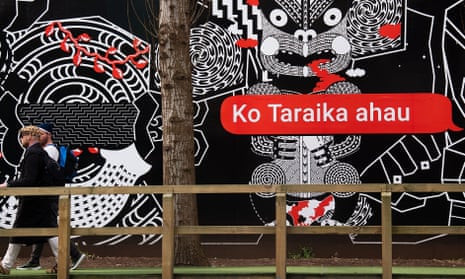A decision by New Zealand’s broadcasting watchdog to no longer engage with complaints about the use of Māori language has been celebrated as cementing “a new era of broadcasting in Aotearoa”.
The Broadcasting Standards Authority (BSA) said on Wednesday it had “drawn a line” under the use of te reo in broadcasts after receiving a fivefold increase in inquiries since June last year. Two from 27 had resulted in formal complaints.
The most recent was about the use of te reo across TVNZ, with the complainant “KS” saying it discriminated against non-Māori speakers. The BSA declined to rule on the complaint because no standards had been breached, then went one step further in saying it would not engage with similar correspondence in future.
It also encouraged individual broadcasters to refer to its finding in responding to complaints they received directly. Though te reo Māori is an official language of New Zealand, speaking it on air is often met with pushback and racist remarks.
The look I serve anyone who has made or will even attempt now to formally complain about the use of reo...
— Māni Dunlop (@manidunlop) March 9, 2021
“the big difference now is they're saying 'we're not going to take any notice' ... this is just the way of the world, step up, embrace it.”https://t.co/VgQu8mGY6s pic.twitter.com/PNQp8gyxBa
Radio New Zealand said it had received 12 formal complaints about te reo since July 2020, not including the “many angry texts and emails” sent to presenters.
Māni Dunlop, RNZ’s Māori news director and host of Te Pūrongo o te Poutūtanga: Midday Report, told the Guardian the BSA decision was “better late than never”, and indicative of where New Zealand’s media was headed.
“It feels like we are in a new era of broadcasting in Aotearoa, where finally the use of te reo Rangtira – an official language of this country – has no grounds to make a formal complaint. I encourage everyone to get on the waka [canoe], so you don’t get left behind.”
Dunlop also acknowledged the part played by broadcasters, past and present, who had been “unapologetic in their use of te reo Māori on television and our airwaves for years, and dealing with a huge amount of vitriol for doing so”.
But te reo was just one step in the right direction, Dunlop said. “The challenge now is to continue its use and commit further to shifting narratives, diversifying our media landscape, and create a true reflection of Aotearoa in the public sphere.”
In recent months, New Zealand media companies have taken steps to condemn and be accountable for racist views published on their platforms.
Earlier this month, an article by the former cabinet minister and historian Michael Bassett complaining of the “bizarre craze” for Māori culture – including the increasing use of te reo – was withdrawn from the New Zealand Herald website.
Publisher NZME said the article fell short of standards “and should not have been published”, and that Bassett would not be published on its platforms again.
In January, former Act party leader John Banks was axed from his Magic Talk radio show after his discussion with a caller about “stone age Māori culture” sparked public outrage and the withdrawal of advertisers.
Parent company MediaWorks later said Banks had committed a “serious breach” of broadcasting standards and that all staff would be educated on “cultural understanding”.
Banks was proud of having prompted more complaints to the BSA than any broadcaster in New Zealand. Separately, the watchdog recently announced a review of its codes to ensure they were up-to-date with “societal change”.
Leonie Hayden, Ātea editor of The Spinoff, said both Banks’ and Bassett’s commentary would have likely failed BSA standards for fairness, balance and accuracy – separate to any question of racism.
“Media will continue to host contributors with racist views. A lot of what I consider to be a white supremacist or colonial worldview still gets through to mainstream media as a matter of course.”
But the right to speak te reo, as reaffirmed by the BSA today, was irrevocable under the New Zealand constitution, Hayden said. “You can complain it’s woke, you can complain it’s divisive. It’s simply the law. …
“There’s no ‘two sides’ to it, and I’m really pleased the BSA have made a point of letting people know that.”
